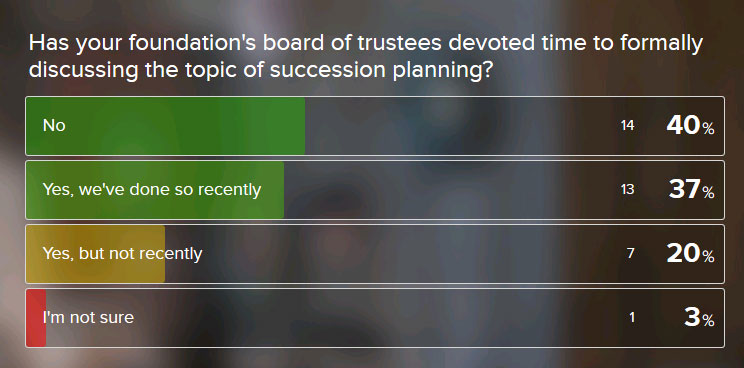In October, we asked Philanthropy Northwest members a few questions about succession planning. Here's what we found.
We had 35 respondents, representing about 20% of our member foundations. Most (74%) of the respondents were CEOs and the remainder (26%) were board members or trustees. Most respondents (63%) were from foundations with more than 3 staff, but just over a third (37%) were from foundations with 3 or fewer staff members. Respondents have been in their current role from 1-20 years, with a median length of service of 9 years.
Why Succession Planning Matters
Nearly 2/3 of the CEOs in our sample expect to depart within 5 years. 33% of CEOs we surveyed reported that they anticipate leaving in the next 2-3 years, and another 29% said they anticipate leaving in the next 3-5 years. 38% anticipate spending 5 or more additional years in their jobs.
Most foundations are not promoting from within. 92% of CEOs in our sample reported that they are not grooming a successor within their current team, while 80% of board members report that their board does not see anyone within the organization as a viable successor to the current CEO.
It Can Be Hard to Address
While 72% of the CEOs in our group reported that they have raised the topic of succession planning with their board, 40% of foundation boards have never addressed succession planning. Another 20% have not addressed it recently.
Foundation CEOs are the ones who most often initiate conversations about succession planning. Of those foundations who have addressed succession planning, 60% of our respondents reported that it was the CEO who had initiated the discussion.

Both boards and CEOs reported that the biggest barrier preventing them from addressing succession planning is prioritizing it among all of the other "urgent" issues that demand immediate attention. About 20% of respondents reported one more "discomfort" barriers, e.g. don't want to create a self-fulfilling prophecy, not sure board is ready to address it, don't want to create the impression that I'm thinking about leaving, etc. -- but none predominated. CEO responses to this question shown below. (Board member responses were similar.)
The Plans We Have
The most common kind of succession plan our respondents reported having is an emergency plan -- 37% of foundations told us they've got a plan to handle the unexpected absence of an executive. 29% said they have a plan for strategic leadership development and 11% said they have a departure-defined plan -- a plan for transition over 18-24 months where the executive has announced a departure date. 46% of respondents said they have no succession plans at all.
Those Who Have Planned Found it Useful
Respondents reported the following benefits from addressing succession planning:
Improved staff leadership capabilities
Smooth transitions
Greater likelihood of succession from within
More attention to staff morale and retention through sabbaticals, competitive compensation, etc.
Helps staff and board think more strategically about vision/mission programs
Invigorated board recruitment
Peace of mind, decreased anxiety -- "the basics will still happen on time if I get hit by a bus."
Useful Resources
We asked respondents what resources they've found helpful in addressing succession planning. Here's what we heard:
Building Leaderful Organizations from the Annie E. Casey Foundation
Chief Executive Succession Planning from BoardSource
Advice and materials from Philanthropy Northwest member (and board member) Jock Edwards of Sherwood Trust
Advice from other network members
Advice and materials from The Giving Practice (aww!)
How We Can Help
Philanthropy Northwest can connect you with other leaders in our network who have raised succession planning in their organizations, made succession plans and had successful transitions. Our consulting team at The Giving Practice can help design and facilitate conversations about succession using our knowledge of other foundations and help with inbound transition of a new CEO and/or outward transition of an existing CEO. We're happy to chat!


